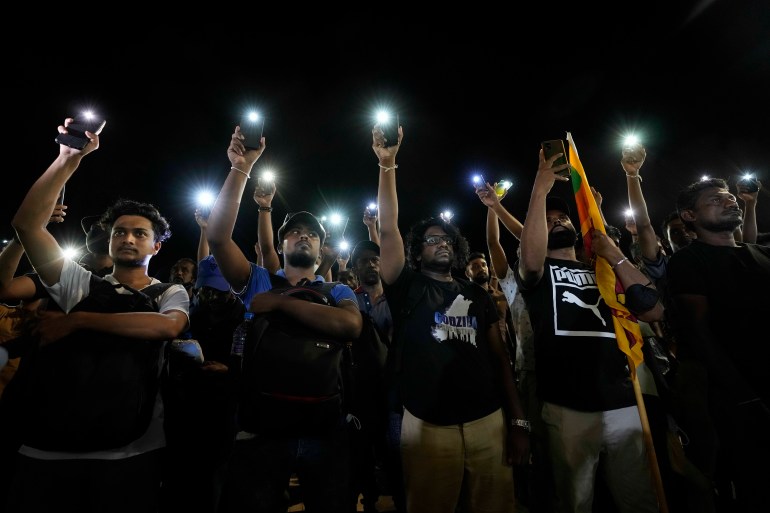Sri Lankan town under curfew day after protester killed: Report
Government promises to investigate allegations that police used excessive force to disperse protesters.

Police have kept up a curfew in central Sri Lanka, a day after the killing of an anti-government demonstrator triggered international condemnation.
The government on Wednesday promised investigations into allegations that police used excessive force to disperse people protesting across the island against high fuel prices and demanding President Gotabaya Rajapaksa’s resignation over the worsening economic crisis.
Keep reading
list of 4 itemsIMF says Sri Lanka needs to be on a sustainable debt path
Sri Lanka president expands cabinet amid economic crisis protests
Sri Lankans mark new year at protest camp near president’s office
Sri Lanka is in the grip of its worst economic downturn since independence in 1948, with regular blackouts, severe shortages of fuel and other goods and record inflation causing widespread misery.
“I have already initiated an inquiry into the conduct of officers at Rambukkana,” police chief Chandana Wickramaratne said in a statement as he ordered an indefinite curfew in the area, the AFP news agency reported on Wednesday.
According to an earlier statement by the police, a crowd of people was about to set a diesel tanker alight when officers opened fire to disperse them in Rambukkana, 95km (60 miles) east of the capital.
At least 29 people, including 11 policemen, were wounded in the first fatal clash since anti-government protests broke out this month, officials said.
“Deeply distressed following the tragedy in Rambukkana,” Rajapaksa said in a tweet on Wednesday. “I have every confidence that a strict, impartial investigation will be carried out.”
Colombo-based envoys, including those from Britain, Canada and the United States, expressed concern over the police shooting and called for restraint from all sides as Sri Lanka opens bailout talks with the International Monetary Fund in Washington, DC.
“A full, transparent investigation is essential and the people’s right to peaceful protest must be upheld,” US Ambassador Julie Chung said.
British High Commissioner Sarah Hulton added: “I condemn violence in all forms and call for restraint.”
And her Canadian counterpart David McKinnon said that “those instigating violence must be accountable”.
Within hours of the shooting in Rambukkana, police fired tear gas to break up another protest in the south of the island, but there were no immediate reports of casualties, officials and residents said.
Police had moved in to disperse people occupying a main road and blocking traffic in Matara, 160km (100 miles) south of Colombo, residents said.

Across the country, there were protests against a sharp increase in fuel prices and the shortage of diesel and petrol as the government seeks three to four billion dollars from the IMF to overcome its balance-of-payments crisis and boost depleted reserves.
Sri Lankans have endured months of shortages of essentials such as food, cooking gas, fuel and medicine, lining up for hours to buy the very limited stocks available.
Fuel prices have risen several times in recent months, resulting in sharp increases in transport costs and prices of other essentials. There was another round of increases earlier this week.
In the capital Colombo, thousands of protesters continued to occupy the entrance to the president’s seafront office since April 9, demanding the leader step down.
Rajapaksa acknowledged public anger over the ruling family’s mismanagement on Monday, after appointing a new cabinet to try to assuage fury over the crisis.
Sri Lanka’s economic meltdown came after the coronavirus pandemic torpedoed vital revenue from tourism and remittances and the government last week announced a default on huge foreign debt.